← Back to Reviews
in
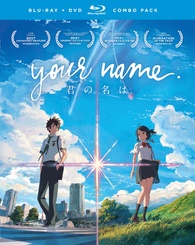
August 26, 2016 (Japan)
April 7, 2017 (United States)
107 minutes
Rated PG for thematic elements, suggestive content, brief language, and smoking
1.78:1
Directed by Makoto Shinkai
Written by Makoto Shinkai
Produced by Kōichirō Itō and Katsuhiro Takei
Characters Designed by Masayoshi Tanaka and Masashi Ando
Music by RADWIMPS
Dream Lantern (Yume Tōrō), Zenzenzense, Sparkle, and Nandemonaiya written, composed, and performed by Yojiro Noda
Voice Talent (2017 NYAV Post dub):
Michael Sinterniklaas as Taki Tachibana
Stephanie Sheh as Mitsuha Miyamizu
Kyle Hebert as Katsuhiko Teshigawara
Cassandra Lee Morris as Sayaka Natori
Ben Pronsky as Tsukasa Fujii
Ray Chase as Shinta Takagi
Laura Post as Miki Okudera
Glynis Ellis as Hitoha Miyamizu
Catie Harvey as Yotsuha Miyamizu
Scott Williams as Toshiki Miyamizu
Michelle Ruff as Futaba Miyamizu
Katy Vaughn as Yukari Yukino
Marc Diraison as Taki's Father
Voice Talent (Japanese):
Ryūnosuke Kamiki as Taki Tachibana
Mone Kamishiraishi as Mitsuha Miyamizu
Ryo Narita as Katsuhiko Teshigawara
Aoi Yūki as Sayaka Natori
Nobunaga Shimazaki as Tsukasa Fujii
Kaito Ishikawa as Shinta Takagi
Masami Nagasawa as Miki Okudera
Etsuko Ichihara as Hitoha Miyamizu
Kanon Tani as Yotsuha Miyamizu
Masaki Terasoma as Toshiki Miyamizu
Sayaka Ohara as Futaba Miyamizu
Kana Hanazawa as Yukari Yukino
Kazuhiko Inoue as Taki's Father
Let's make one thing clear right off the bat: Your Name is one of my favorite movies. It's one I can throw into my Blu-ray player any time. Rising filmmaker Makoto Shinkai's animated summer blockbuster has earned a reputation as one of the best of its kind, exploring themes of love, loss, abandonment, and the human condition through a perhaps unusual, but no less effective, sci-fi/fantasy lens. With its stunning animation, gripping storytelling, likable characters, faultless voice acting (in both English and Japanese), and incredible RADWIMPS musical score and songs, this lovingly crafted film isn't one to miss.
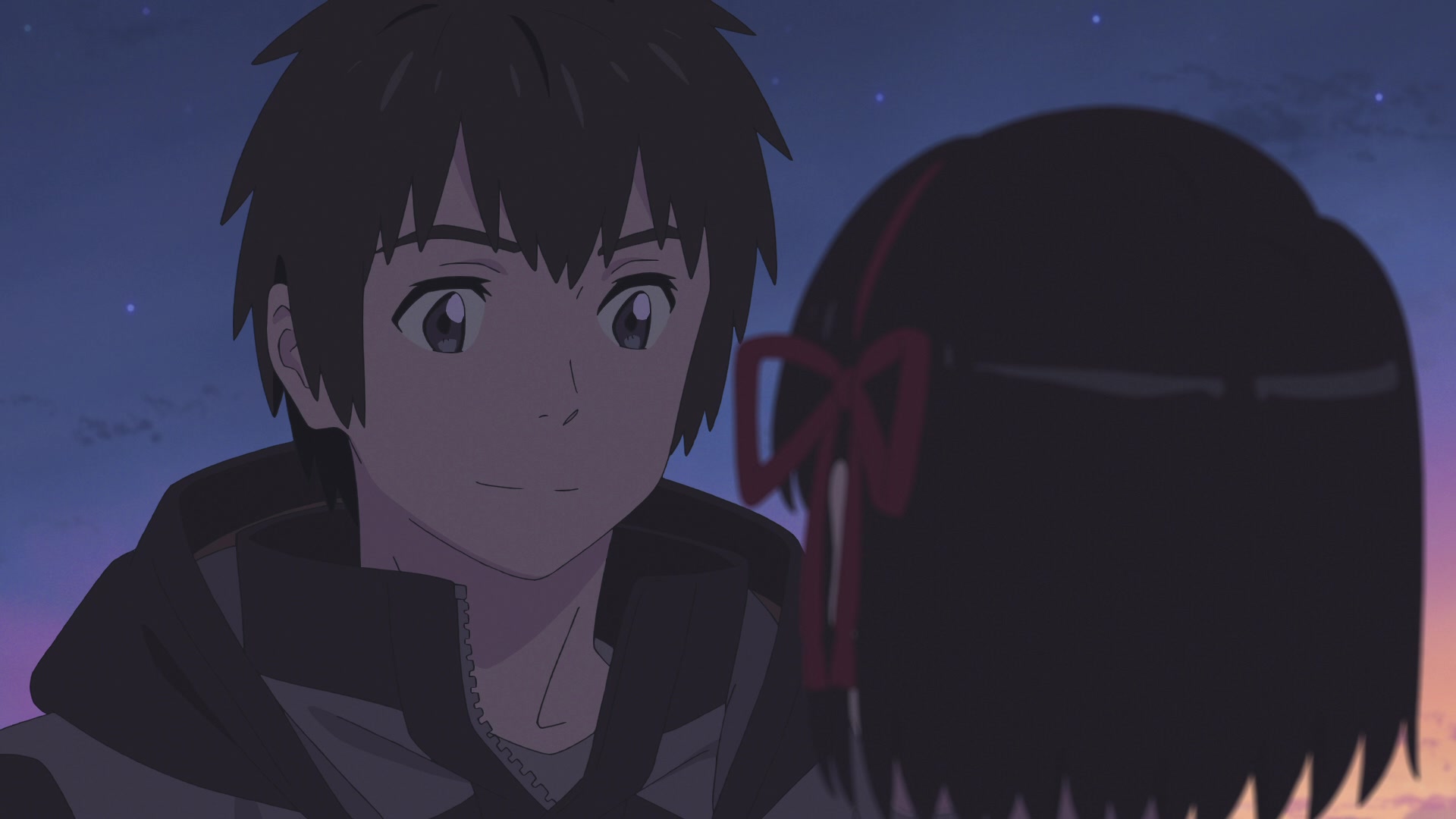
17-year-old Taki Tachibana (Michael Sinterniklaas in the 2017 NYAV Post dub, Ryūnosuke Kamiki in Japanese) lives in Tokyo with his father (Marc Diraison, Kazuhiko Inoue) and works as a waiter at an Italian restaurant. Taki leads a simple life, spending much of his time with his friends Tsukasa Fujii (Ben Pronsky, Nobunaga Shimazaki) and Shinta Takagi (Ray Chase, Kaito Ishikawa). 17-year-old Mitsuha Miyamizu (Stephanie Sheh, Mone Kamishiraishi) lives in Itomori, a small town in the Japanese countryside where everyone knows everyone, with her 82-year-old grandmother Hitoha (Glynis Ellis, Etsuko Ichihara) and 9-year-old sister Yotsuha (Catie Harvey, Kanon Tani), carrying on her family's shrine maiden tradition. Mitsuha's father Toshiki (Scott Williams, Masaki Terasoma), who is the mayor of Itomori, walked out on the family when Mitsuha's mother Futaba (Michelle Ruff, Sayaka Ohara) passed away. Mitsuha also leads a simple life, spending most of her days with her friends Katsuhiko Teshigawara (Kyle Hebert, Ryo Narita) and Sayaka Natori (Cassandra Lee Morris, Aoi Yūki). However, Mitsuha has grown discontent with this life, essentially feeling suffocated and chained down, to the point of wishing to be "a handsome Tokyo boy in [her] next life." Taki and Mitsuha's simple lives are thrown into disarray when they begin periodically waking up in each other's bodies. Taki-as-Mitsuha is more assertive, not suffering bullies and gossips, often frightening those around Mitsuha who have gotten used to her silently putting up with being mistreated, though also worrying Mitsuha's friends and teacher, Yukari Yukino (Katy Vaughn, Kana Hanazawa), who think Mitsuha's forgotten her name. While a bit self-effacing and insecure in contrast to Taki's laid-back and assertive ways, and also worrying Taki's friends when she knows next to nothing about his life, Mitsuha-as-Taki is a hit with those around Taki, even influencing Taki's relationship with his coworker Miki Okudera (Laura Post, Masami Nagasawa), who Taki has a crush on. Taki and Mitsuha eventually begin to rub off on each other and begin to fall in love, but when Taki decides to go meet Mitsuha in person after the switches abruptly stop, he meets a far more formidable obstacle than the distance between Tokyo and Itomori.
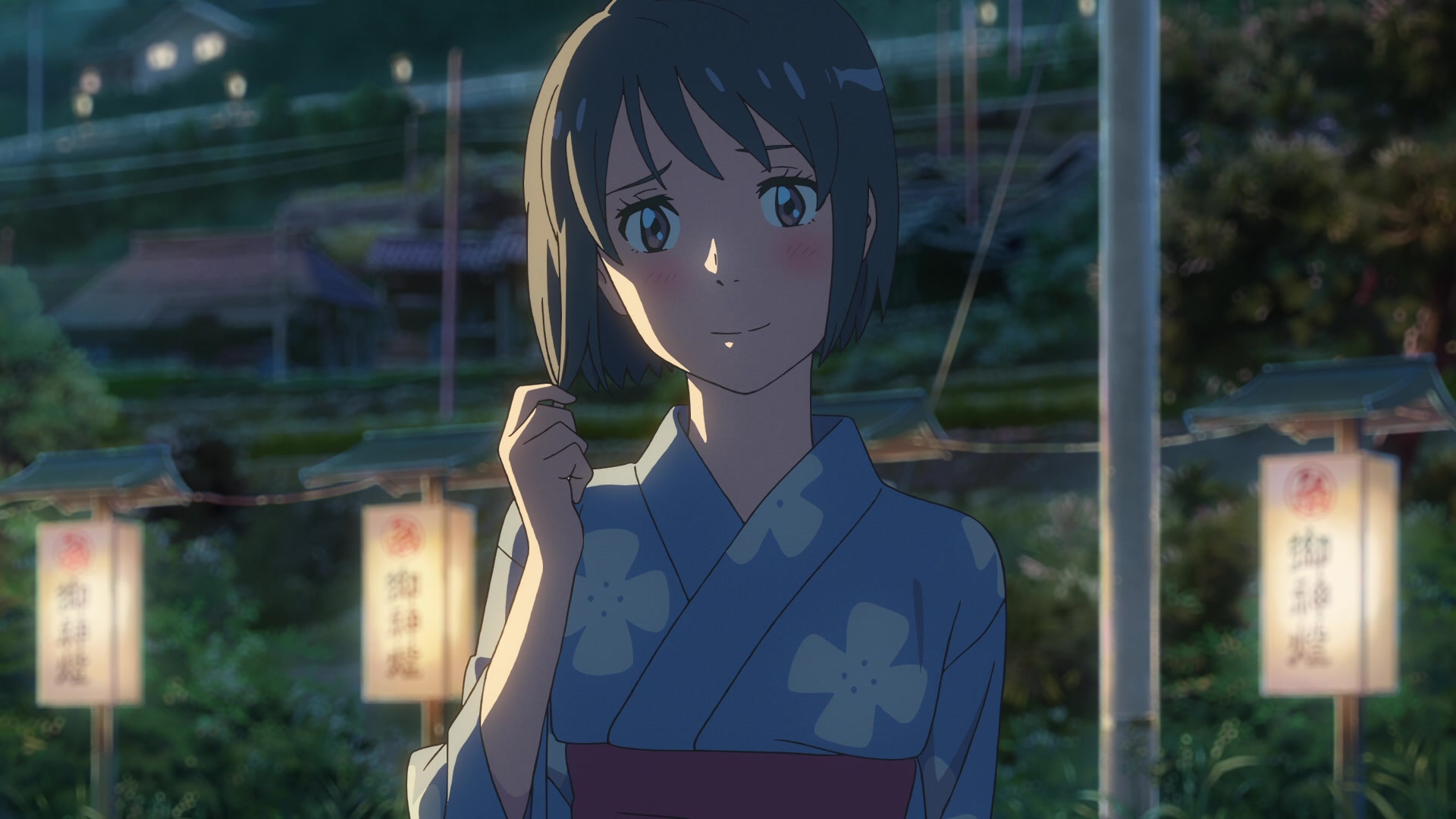
One of the film's greatest strengths is Shinkai's storytelling, the filmmaker exploring many themes throughout its 107-minute length. Shinkai infuses Your Name with enough heart, soul, and character depth that viewers will discern more and more with each new viewing, making repeated viewings even more rewarding. One of the themes Shinkai explores is the positive ways the person or people you love can rub off on you. Taki and Mitsuha's character development throughout the film—especially in the latter half—exemplifies this. We see Taki become kinder and gentler and Mitsuha become more confident and assertive. To be clear, Taki doesn't become as submissive and self-effacing as Mitsuha is when she opens the film. Neither does Mitsuha become as brash or arrogant as Taki is early in the film. Both characters simply become more balanced throughout the film, with neither becoming too much like the other. On a more personal note, Taki's character development heavily resonates with me because he mirrors many character changes I underwent as my teenage years ended and I became an adult. Looking back, I was a lot like Taki as a teenager. I was arrogant. I thought I knew everything, and I thought I could do everything on my own. In one scene later in the film, he bluntly tells Tsukasa and Ms. Okudera, "I don't need a babysitter," and in another, "You haven't done anything," which should give you an idea of what I was like at that age. The film also boasts well-developed supporting characters. Taki's friendship with Tsukasa and Takagi produces some good-natured jiving—usually about Mitsuha's antics while in Taki's body—that builds some of the film's more lighthearted moments. The scenes with Taki and Ms. Okudera are also some of the film's best. The fact that they maintain a healthy friendship after Ms. Okudera realizes Taki now likes someone else—even before Taki himself does—is something all too rarely seen in cinema. In many other films, this scene would precede a lengthy, drawn-out verbal brawl full of F-bombs, so Shinkai's decision to skip that route is refreshing. Sayaka and Teshigawara also rank as some of the film's most likable characters, contributing to some of the film's more lighthearted scenes in much the same way as Taki's friends. Yotsuha contributes to much of the film's well-considered humor. Be it her reactions to Taki's antics in Mitsuha's body, or to Mitsuha asking to be a Tokyo boy in her next life, or to Hitoha's speeches about the old Miyamizu traditions, Yotsuha nearly always has some kind of deadpan remark that's all but guaranteed to garner a few belly laughs even with repeated viewings. While steeped in the old tradition Mitsuha's fed up with, Hitoha is a good grandmother to Mitsuha and Yotsuha, giving some genuine insights periodically throughout the film. Even Toshiki, who's arguably the closest thing Your Name has to a human antagonist, has a well-developed backstory that explains why he's the way he is. Having such well-developed characters only adds to the film's exploration of the human condition. The film deftly explores human bonds and connections, what it is to be in love, and what it is to feel like you're "always searching for something" through Taki and Mitsuha's main storyline. The scene where they finally meet in person is incredibly satisfying as a result. The film also expertly explores themes of loss and abandonment with Toshiki's storyline and the issues between him and Mitsuha. The way Shinkai incorporates sci-fi and fantasy themes into the film is also very effective. Moreover, all of this leads to one of the most satisfying endgames in the history of film. Overall, the film's storytelling is nothing to sneeze at and it's a big part of why it's such a rewarding film.
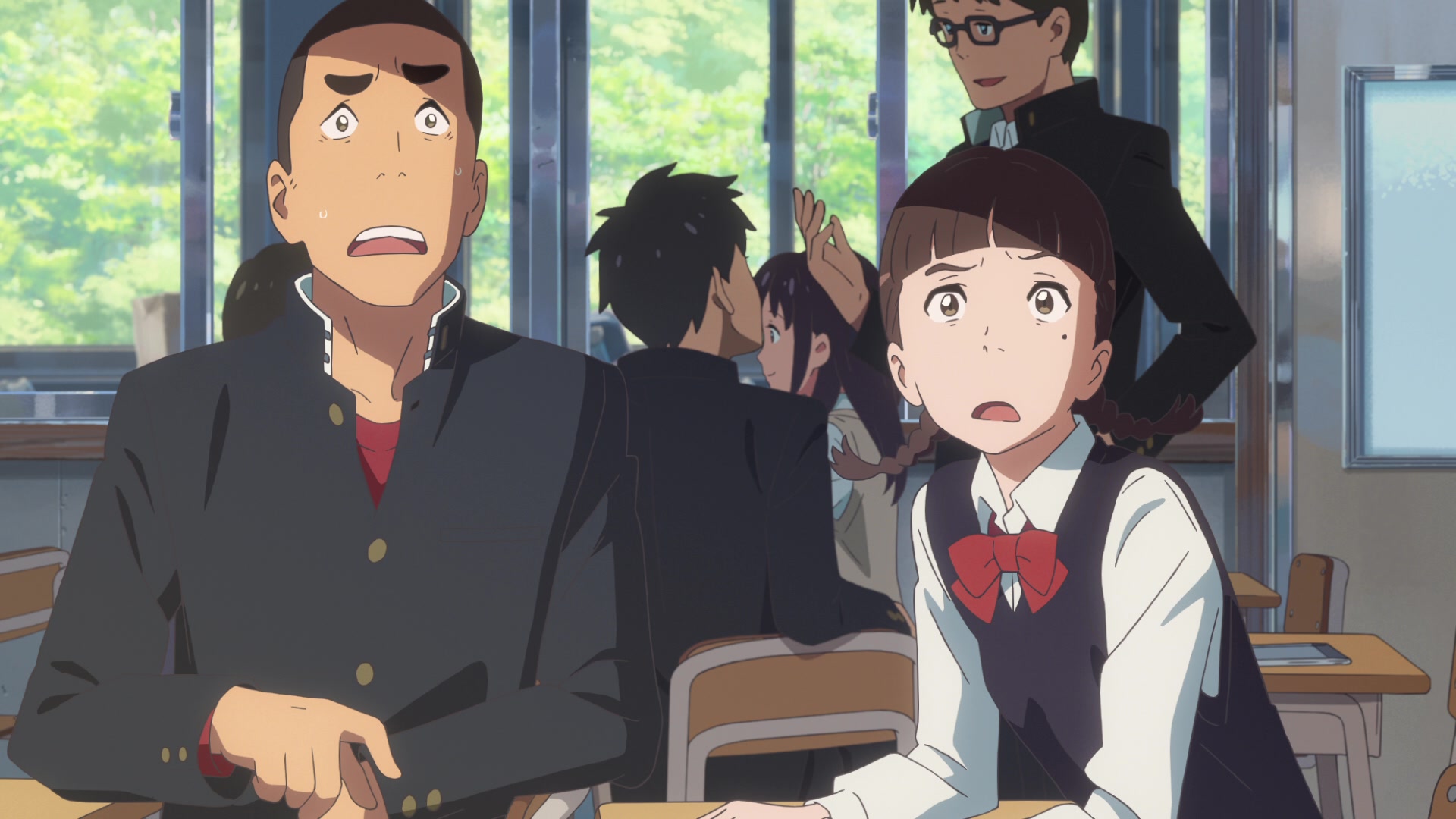
The animation is stunning, as you'd expect from a Shinkai film. The colors are absolutely jaw-dropping, namely reds, blues, oranges, and purples, the latter especially prevalent in scenes depicting dusk, often called "magic hour" in the film. The landscapes and backdrops are equally impressive. Shinkai's animators have meticulously recreated real-life Tokyo locations, from the architecture of buildings and skyscrapers to street lights to even greenery in the surrounding area. Even the train lines in the film are real-life Tokyo lines. The resulting depiction is very accurate to what the real-life Tokyo looks like. While fictional, Itomori is also close to what the Japanese countryside looks like in the real world. The skies are incredibly well-realized. Even Taki's sketches of Itomori are incredibly detailed and realistic to the point of looking like real sketches. Masayoshi Tanaka and Masashi Ando's character designs are realistic and well-suited to the film, with a wide array of facial expressions, natural skin tones, and realistic clothing. On that note, Shinkai explains in an interview included on the film's Blu-ray release that the animators make Taki's eyes bigger when Mitsuha is in his body, and Mitsuha's eyes smaller when Taki is in her body. The animators have also done a great job of animating light, as seen in the shading and in shots where light is reflected, such as a shot of Taki's smartphone's darkened screen under a lamp. This makes objects look very real and gives the film's look an overall realistic feel. Natural phenomena such as rain, snow, and even a comet are also well-done and highly realistic. Overall, Your Name couldn't have been animated better.
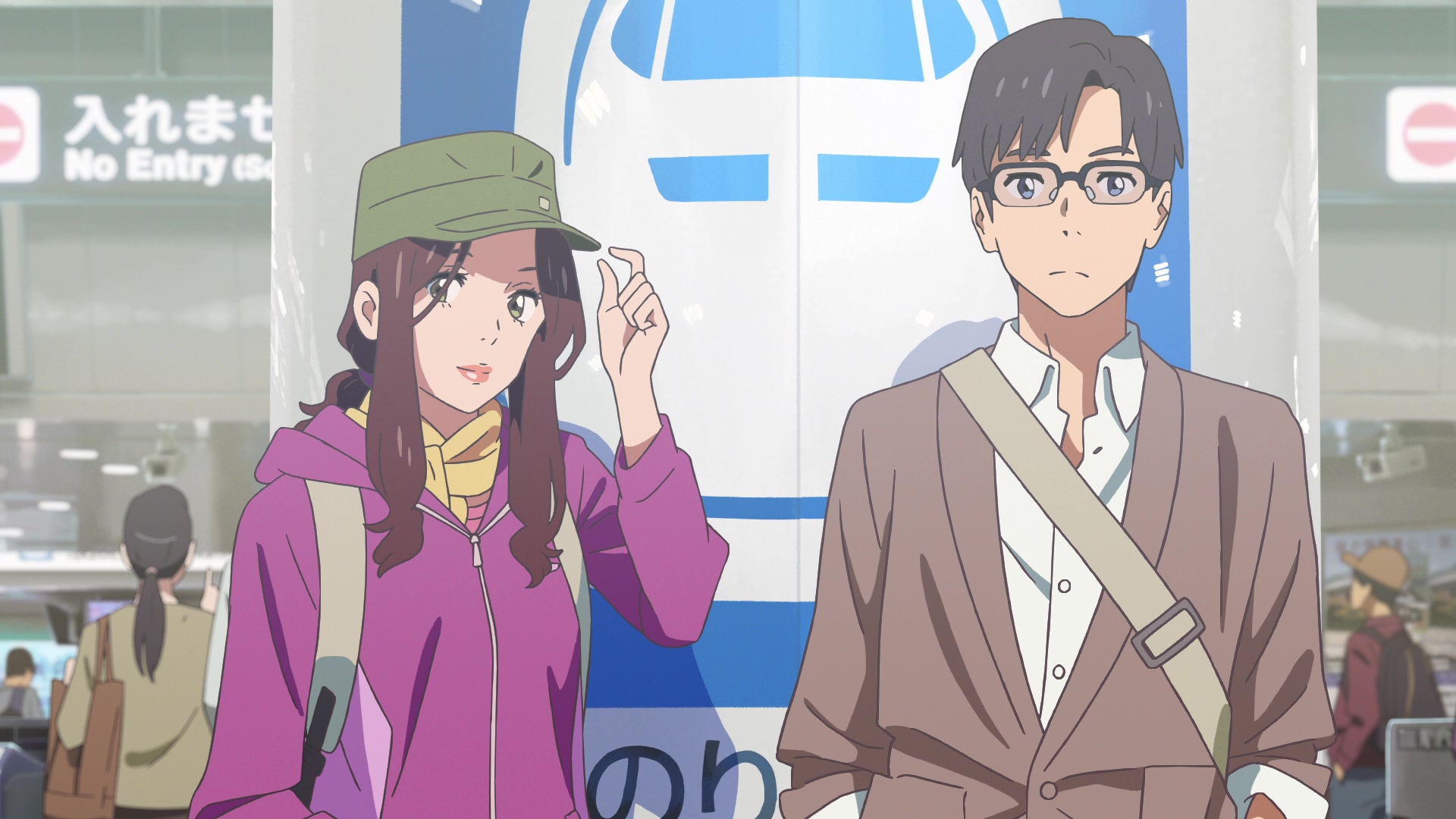
Your Name is also incredibly well-acted in both English and Japanese. Sinterniklaas (who also co-directs the film's excellent English dub with Sheh) and Kamiki are excellent as Taki, both effectively capturing the character's self-confidence and initial arrogance while dialing back the arrogance in just the right way to follow Taki's character growth. While both excel in these scenes, I'm always especially impressed by how Sinterniklaas picks up the feminine tones when Mitsuha is in Taki's body, notable examples being an early scene where Mitsuha picks up Taki's phone and asks no one in particular, "Tsukasa? Who's that?", and Mitsuha's first meeting with Taki's friends. Sheh and Kamishiraishi also impress as Mitsuha, capturing the character's more quiet and self-effacing ways. They also effectively pick up the masculine tones when Taki is in Mitsuha's body. In a slightly different way, they also keep up as Mitsuha's resolve strengthens in the film's latter half. Hebert and Narita are also excellent as Teshigawara, the more boisterous of Mitsuha's two best friends, who is often even blunter than Taki. Morris and Yūki are equally impressive as Sayaka, Mitsuha's more dutiful and perfectionistic friend. Pronsky and Shimazaki are also up to par as Tsukasa, one of Taki's best friends who is perhaps a bit meddlesome, but well-meaning. Chase and Ishikawa are also solid as Takagi, the more carefree of Taki's friends. Post and Nagasawa are terrific as Ms. Okudera, Taki's compassionate and charming coworker who he initially has a thing for. So are Ellis and Ichihara as Hitoha, Mitsuha's wise old grandmother who may know a bit more about what's happening than she lets on. Harvey and Tani steal several scenes as Yotsuha, Mitsuha's wisecracking sister. Williams and Terasoma are also rock-solid as Toshiki, Mitsuha's stubborn father. So are Diraison and Inoue as Taki's father, Vaughn and Hanazawa as Ms. Yukino, Mitsuha's teacher who is also the female lead in Shinkai's short film The Garden of Words, and Ruff and Ohara as Futaba, Mitsuha's late mother, as brief as their screen time might be. The rest of the two casts are also up to par. All told, Your Name is full of life, character depth, and purpose in both English and Japanese. My suggestion would be to watch it in both languages and enjoy both.

Another unforgettable element of Your Name is the music by RADWIMPS. RADWIMPS has created not only the musical score but also four vocal songs that Yojiro Noda performs in English for the dub and in Japanese for the sub. The songs are absolutely beautiful in both languages, which is another very good reason to watch the film in both languages. While some have criticized the fact that the film has four songs, I've come to love all of them, and I couldn't imagine the film without them. From the moment Dream Lantern (Yume Tōrō) sounds over the film's title card, we know RADWIMPS is about to deliver something special, the lyrics speaking to many of the themes the film deals with. Zenzenzense is arguably the most remembered since it even got its own single, not to mention its appearance in nearly every trailer. It's certainly the most upbeat of the four songs that feature in the film and its popularity isn't exactly undeserved. Sparkle is also very effective, with many of its lyrics seeming to reflect many of Mitsuha's feelings towards Itomori and the old traditions. The instrumental pieces are also beautiful. Date, Mitsuha's Theme, Magic Hour, and Date 2 stand out as some of the most poignant pieces of music in the film. Kuchikamizake Trip and Council of War get the blood pumping. Pieces like Cafe at Last and Unusual Changes of Two effectively capture the more lighthearted and humorous sequences. To top it all off, the film closes with the simultaneously triumphant and poignant Nandemonaiya ("Never Mind" or "It's Nothing"), which is my personal favorite of the film's vocal pieces, reflecting perfectly on the film that preceded it. An incredible sound design pulls it all together to make the film just that much more immersive.
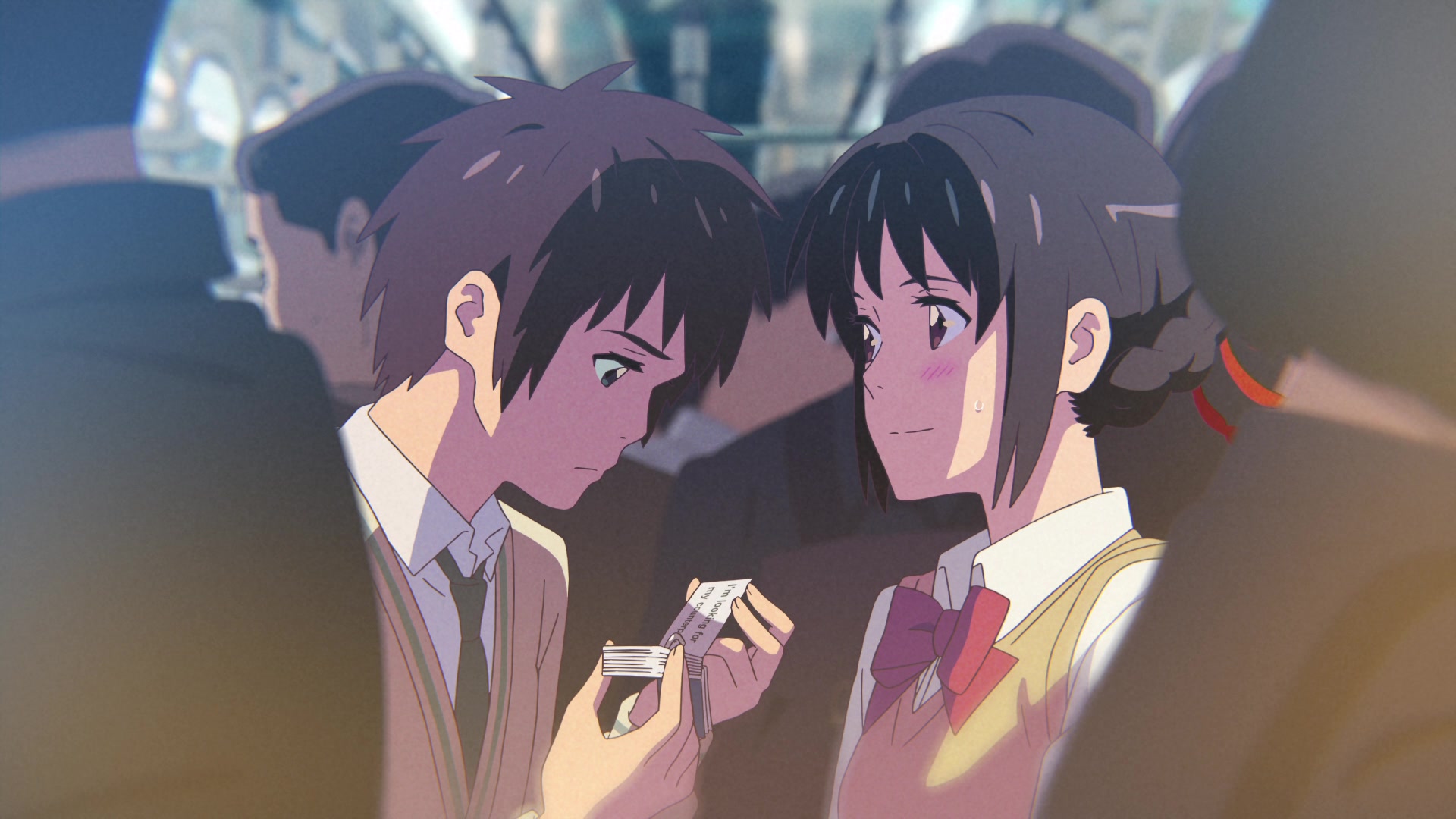
I won't even try to deny it: I love Makoto Shinkai's Your Name. The film is sweet, charming, fun, uplifting, thought-provoking, poignant, and emotionally satisfying. I've found it consistently rewarding with repeated viewings, and it's become a favorite of mine. I can just throw Your Name into my Blu-ray player after a lousy day, and it always puts a smile on my face, always makes me laugh during the funny parts, and always makes me feel a bit better by the time the credits roll. If I were completely honest, I'd say Your Name deserves its reputation and all the awards it won, including, but not limited to, the Newtype Anime Award for Best Picture and the Seiyu Awards for Best Actor and Best Actress. With likable characters, engrossing storytelling, faultless voice acting—in both English and Japanese, RADWIMPS' incredible music, a positive message about how the people we love can change us and how much we can accomplish for the people who matter to us and, yes, stunning animation, Your Name earns my highest recommendation.

August 26, 2016 (Japan)
April 7, 2017 (United States)
107 minutes
Rated PG for thematic elements, suggestive content, brief language, and smoking
1.78:1
Directed by Makoto Shinkai
Written by Makoto Shinkai
Produced by Kōichirō Itō and Katsuhiro Takei
Characters Designed by Masayoshi Tanaka and Masashi Ando
Music by RADWIMPS
Dream Lantern (Yume Tōrō), Zenzenzense, Sparkle, and Nandemonaiya written, composed, and performed by Yojiro Noda
Voice Talent (2017 NYAV Post dub):
Michael Sinterniklaas as Taki Tachibana
Stephanie Sheh as Mitsuha Miyamizu
Kyle Hebert as Katsuhiko Teshigawara
Cassandra Lee Morris as Sayaka Natori
Ben Pronsky as Tsukasa Fujii
Ray Chase as Shinta Takagi
Laura Post as Miki Okudera
Glynis Ellis as Hitoha Miyamizu
Catie Harvey as Yotsuha Miyamizu
Scott Williams as Toshiki Miyamizu
Michelle Ruff as Futaba Miyamizu
Katy Vaughn as Yukari Yukino
Marc Diraison as Taki's Father
Voice Talent (Japanese):
Ryūnosuke Kamiki as Taki Tachibana
Mone Kamishiraishi as Mitsuha Miyamizu
Ryo Narita as Katsuhiko Teshigawara
Aoi Yūki as Sayaka Natori
Nobunaga Shimazaki as Tsukasa Fujii
Kaito Ishikawa as Shinta Takagi
Masami Nagasawa as Miki Okudera
Etsuko Ichihara as Hitoha Miyamizu
Kanon Tani as Yotsuha Miyamizu
Masaki Terasoma as Toshiki Miyamizu
Sayaka Ohara as Futaba Miyamizu
Kana Hanazawa as Yukari Yukino
Kazuhiko Inoue as Taki's Father
"I was planning to tell you that wherever you are in the world, I swear that I'll find you again no matter what."
Let's make one thing clear right off the bat: Your Name is one of my favorite movies. It's one I can throw into my Blu-ray player any time. Rising filmmaker Makoto Shinkai's animated summer blockbuster has earned a reputation as one of the best of its kind, exploring themes of love, loss, abandonment, and the human condition through a perhaps unusual, but no less effective, sci-fi/fantasy lens. With its stunning animation, gripping storytelling, likable characters, faultless voice acting (in both English and Japanese), and incredible RADWIMPS musical score and songs, this lovingly crafted film isn't one to miss.

17-year-old Taki Tachibana (Michael Sinterniklaas in the 2017 NYAV Post dub, Ryūnosuke Kamiki in Japanese) lives in Tokyo with his father (Marc Diraison, Kazuhiko Inoue) and works as a waiter at an Italian restaurant. Taki leads a simple life, spending much of his time with his friends Tsukasa Fujii (Ben Pronsky, Nobunaga Shimazaki) and Shinta Takagi (Ray Chase, Kaito Ishikawa). 17-year-old Mitsuha Miyamizu (Stephanie Sheh, Mone Kamishiraishi) lives in Itomori, a small town in the Japanese countryside where everyone knows everyone, with her 82-year-old grandmother Hitoha (Glynis Ellis, Etsuko Ichihara) and 9-year-old sister Yotsuha (Catie Harvey, Kanon Tani), carrying on her family's shrine maiden tradition. Mitsuha's father Toshiki (Scott Williams, Masaki Terasoma), who is the mayor of Itomori, walked out on the family when Mitsuha's mother Futaba (Michelle Ruff, Sayaka Ohara) passed away. Mitsuha also leads a simple life, spending most of her days with her friends Katsuhiko Teshigawara (Kyle Hebert, Ryo Narita) and Sayaka Natori (Cassandra Lee Morris, Aoi Yūki). However, Mitsuha has grown discontent with this life, essentially feeling suffocated and chained down, to the point of wishing to be "a handsome Tokyo boy in [her] next life." Taki and Mitsuha's simple lives are thrown into disarray when they begin periodically waking up in each other's bodies. Taki-as-Mitsuha is more assertive, not suffering bullies and gossips, often frightening those around Mitsuha who have gotten used to her silently putting up with being mistreated, though also worrying Mitsuha's friends and teacher, Yukari Yukino (Katy Vaughn, Kana Hanazawa), who think Mitsuha's forgotten her name. While a bit self-effacing and insecure in contrast to Taki's laid-back and assertive ways, and also worrying Taki's friends when she knows next to nothing about his life, Mitsuha-as-Taki is a hit with those around Taki, even influencing Taki's relationship with his coworker Miki Okudera (Laura Post, Masami Nagasawa), who Taki has a crush on. Taki and Mitsuha eventually begin to rub off on each other and begin to fall in love, but when Taki decides to go meet Mitsuha in person after the switches abruptly stop, he meets a far more formidable obstacle than the distance between Tokyo and Itomori.

One of the film's greatest strengths is Shinkai's storytelling, the filmmaker exploring many themes throughout its 107-minute length. Shinkai infuses Your Name with enough heart, soul, and character depth that viewers will discern more and more with each new viewing, making repeated viewings even more rewarding. One of the themes Shinkai explores is the positive ways the person or people you love can rub off on you. Taki and Mitsuha's character development throughout the film—especially in the latter half—exemplifies this. We see Taki become kinder and gentler and Mitsuha become more confident and assertive. To be clear, Taki doesn't become as submissive and self-effacing as Mitsuha is when she opens the film. Neither does Mitsuha become as brash or arrogant as Taki is early in the film. Both characters simply become more balanced throughout the film, with neither becoming too much like the other. On a more personal note, Taki's character development heavily resonates with me because he mirrors many character changes I underwent as my teenage years ended and I became an adult. Looking back, I was a lot like Taki as a teenager. I was arrogant. I thought I knew everything, and I thought I could do everything on my own. In one scene later in the film, he bluntly tells Tsukasa and Ms. Okudera, "I don't need a babysitter," and in another, "You haven't done anything," which should give you an idea of what I was like at that age. The film also boasts well-developed supporting characters. Taki's friendship with Tsukasa and Takagi produces some good-natured jiving—usually about Mitsuha's antics while in Taki's body—that builds some of the film's more lighthearted moments. The scenes with Taki and Ms. Okudera are also some of the film's best. The fact that they maintain a healthy friendship after Ms. Okudera realizes Taki now likes someone else—even before Taki himself does—is something all too rarely seen in cinema. In many other films, this scene would precede a lengthy, drawn-out verbal brawl full of F-bombs, so Shinkai's decision to skip that route is refreshing. Sayaka and Teshigawara also rank as some of the film's most likable characters, contributing to some of the film's more lighthearted scenes in much the same way as Taki's friends. Yotsuha contributes to much of the film's well-considered humor. Be it her reactions to Taki's antics in Mitsuha's body, or to Mitsuha asking to be a Tokyo boy in her next life, or to Hitoha's speeches about the old Miyamizu traditions, Yotsuha nearly always has some kind of deadpan remark that's all but guaranteed to garner a few belly laughs even with repeated viewings. While steeped in the old tradition Mitsuha's fed up with, Hitoha is a good grandmother to Mitsuha and Yotsuha, giving some genuine insights periodically throughout the film. Even Toshiki, who's arguably the closest thing Your Name has to a human antagonist, has a well-developed backstory that explains why he's the way he is. Having such well-developed characters only adds to the film's exploration of the human condition. The film deftly explores human bonds and connections, what it is to be in love, and what it is to feel like you're "always searching for something" through Taki and Mitsuha's main storyline. The scene where they finally meet in person is incredibly satisfying as a result. The film also expertly explores themes of loss and abandonment with Toshiki's storyline and the issues between him and Mitsuha. The way Shinkai incorporates sci-fi and fantasy themes into the film is also very effective. Moreover, all of this leads to one of the most satisfying endgames in the history of film. Overall, the film's storytelling is nothing to sneeze at and it's a big part of why it's such a rewarding film.

The animation is stunning, as you'd expect from a Shinkai film. The colors are absolutely jaw-dropping, namely reds, blues, oranges, and purples, the latter especially prevalent in scenes depicting dusk, often called "magic hour" in the film. The landscapes and backdrops are equally impressive. Shinkai's animators have meticulously recreated real-life Tokyo locations, from the architecture of buildings and skyscrapers to street lights to even greenery in the surrounding area. Even the train lines in the film are real-life Tokyo lines. The resulting depiction is very accurate to what the real-life Tokyo looks like. While fictional, Itomori is also close to what the Japanese countryside looks like in the real world. The skies are incredibly well-realized. Even Taki's sketches of Itomori are incredibly detailed and realistic to the point of looking like real sketches. Masayoshi Tanaka and Masashi Ando's character designs are realistic and well-suited to the film, with a wide array of facial expressions, natural skin tones, and realistic clothing. On that note, Shinkai explains in an interview included on the film's Blu-ray release that the animators make Taki's eyes bigger when Mitsuha is in his body, and Mitsuha's eyes smaller when Taki is in her body. The animators have also done a great job of animating light, as seen in the shading and in shots where light is reflected, such as a shot of Taki's smartphone's darkened screen under a lamp. This makes objects look very real and gives the film's look an overall realistic feel. Natural phenomena such as rain, snow, and even a comet are also well-done and highly realistic. Overall, Your Name couldn't have been animated better.

Your Name is also incredibly well-acted in both English and Japanese. Sinterniklaas (who also co-directs the film's excellent English dub with Sheh) and Kamiki are excellent as Taki, both effectively capturing the character's self-confidence and initial arrogance while dialing back the arrogance in just the right way to follow Taki's character growth. While both excel in these scenes, I'm always especially impressed by how Sinterniklaas picks up the feminine tones when Mitsuha is in Taki's body, notable examples being an early scene where Mitsuha picks up Taki's phone and asks no one in particular, "Tsukasa? Who's that?", and Mitsuha's first meeting with Taki's friends. Sheh and Kamishiraishi also impress as Mitsuha, capturing the character's more quiet and self-effacing ways. They also effectively pick up the masculine tones when Taki is in Mitsuha's body. In a slightly different way, they also keep up as Mitsuha's resolve strengthens in the film's latter half. Hebert and Narita are also excellent as Teshigawara, the more boisterous of Mitsuha's two best friends, who is often even blunter than Taki. Morris and Yūki are equally impressive as Sayaka, Mitsuha's more dutiful and perfectionistic friend. Pronsky and Shimazaki are also up to par as Tsukasa, one of Taki's best friends who is perhaps a bit meddlesome, but well-meaning. Chase and Ishikawa are also solid as Takagi, the more carefree of Taki's friends. Post and Nagasawa are terrific as Ms. Okudera, Taki's compassionate and charming coworker who he initially has a thing for. So are Ellis and Ichihara as Hitoha, Mitsuha's wise old grandmother who may know a bit more about what's happening than she lets on. Harvey and Tani steal several scenes as Yotsuha, Mitsuha's wisecracking sister. Williams and Terasoma are also rock-solid as Toshiki, Mitsuha's stubborn father. So are Diraison and Inoue as Taki's father, Vaughn and Hanazawa as Ms. Yukino, Mitsuha's teacher who is also the female lead in Shinkai's short film The Garden of Words, and Ruff and Ohara as Futaba, Mitsuha's late mother, as brief as their screen time might be. The rest of the two casts are also up to par. All told, Your Name is full of life, character depth, and purpose in both English and Japanese. My suggestion would be to watch it in both languages and enjoy both.

Another unforgettable element of Your Name is the music by RADWIMPS. RADWIMPS has created not only the musical score but also four vocal songs that Yojiro Noda performs in English for the dub and in Japanese for the sub. The songs are absolutely beautiful in both languages, which is another very good reason to watch the film in both languages. While some have criticized the fact that the film has four songs, I've come to love all of them, and I couldn't imagine the film without them. From the moment Dream Lantern (Yume Tōrō) sounds over the film's title card, we know RADWIMPS is about to deliver something special, the lyrics speaking to many of the themes the film deals with. Zenzenzense is arguably the most remembered since it even got its own single, not to mention its appearance in nearly every trailer. It's certainly the most upbeat of the four songs that feature in the film and its popularity isn't exactly undeserved. Sparkle is also very effective, with many of its lyrics seeming to reflect many of Mitsuha's feelings towards Itomori and the old traditions. The instrumental pieces are also beautiful. Date, Mitsuha's Theme, Magic Hour, and Date 2 stand out as some of the most poignant pieces of music in the film. Kuchikamizake Trip and Council of War get the blood pumping. Pieces like Cafe at Last and Unusual Changes of Two effectively capture the more lighthearted and humorous sequences. To top it all off, the film closes with the simultaneously triumphant and poignant Nandemonaiya ("Never Mind" or "It's Nothing"), which is my personal favorite of the film's vocal pieces, reflecting perfectly on the film that preceded it. An incredible sound design pulls it all together to make the film just that much more immersive.

I won't even try to deny it: I love Makoto Shinkai's Your Name. The film is sweet, charming, fun, uplifting, thought-provoking, poignant, and emotionally satisfying. I've found it consistently rewarding with repeated viewings, and it's become a favorite of mine. I can just throw Your Name into my Blu-ray player after a lousy day, and it always puts a smile on my face, always makes me laugh during the funny parts, and always makes me feel a bit better by the time the credits roll. If I were completely honest, I'd say Your Name deserves its reputation and all the awards it won, including, but not limited to, the Newtype Anime Award for Best Picture and the Seiyu Awards for Best Actor and Best Actress. With likable characters, engrossing storytelling, faultless voice acting—in both English and Japanese, RADWIMPS' incredible music, a positive message about how the people we love can change us and how much we can accomplish for the people who matter to us and, yes, stunning animation, Your Name earns my highest recommendation.
